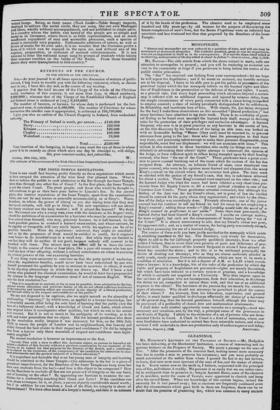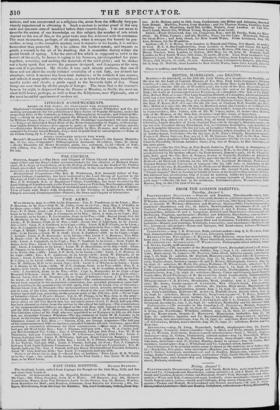GLEANINGS.
MR. HODESIDN'S LECTURES ON THE PROGRESS OF SOCIETY.—Mr. Hodgskinv has been delivering, at the Mechanics' Institution, a course of interesting and ingenious lectures on the Progress of Society. We quote a passage on the uses of Fire. "After the possession of the coarsest food, nothing seems more necessary than fire to enable a man to preserve his existence; and you were probably as much astonished as the author from whom I quoted the fact in my last lecture, to learn, that men were once ignorant of the uses of fire,and the means of obtaining it. Every nation now on the earth is, I believe, acquainted with the principal uses of fire, and obtains it readily. We procure it so easily that we are rather careful to extinguish than to preserve it ; but,i in Ancient Rome, some of the choicest of its maidens, under time name of Vestals, were appointed to cherish and keep alive the sacred flame. When our knowledge of this custom begins, indeed the necessity for it had passed away; but as customs are frequently continued even after the circumstances which gave birth to them are forgotten, there can be no doubt that the practice of preserving fire, which was common to many ancient nations, and was consecrated as a religious rite, arose from the difficulty they previously experienced in obtaining it: • Such a custom is neither proof of the very rude and ignorant state of mankind before their records begin. I do not mean to describe the extent of our knowledge on this subject, the number of arts which depend on the use of fire, or the great tasks man has achieved with its assistance. The most destructive, perhaps, of all agents, when it escapes the bounds he prescribes, as long as the complete mastery over it remains in his hands, it is not less benevolent than powerful. By it he softens the hardest metals, and imparts so gentle a warmth to the air of his dwelling, that it resembles during winter the genial breath of spring. Like the eternal fire which is supposed to exist in the bowels of the earth, he keeps it raging in his furnaces, unextinguished for years together, scorching and melting the materials of the solid globe ; and he strikes out a hasty spark that serves the purpose designed, and disappears at the very moment it is produced. He divides it into such minute portions, that one of them will not affect the easily irritated sensibility of a sick lady, nor disturb her slumbers, while it secures her from total darkness; or he collects it into masses, and reflects it many miles over the ocean, so as to form for the mariner, bewildered amidst rocks and shoals, a guide equal to the heavenly light of day. These things are now done by all the people of Europe. The beam that is the seaman's beacon by night, is dispersed from the Pharos at Messina, in Sicily, the most ancient light-house, perhaps, as well as from the Eddystone, near Plymouth, one of the most beautiful specimens of modern art.



















 Previous page
Previous page